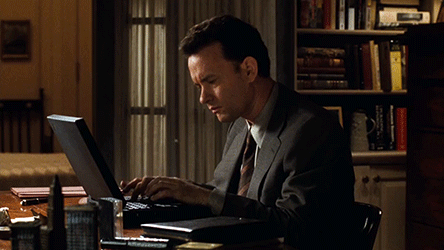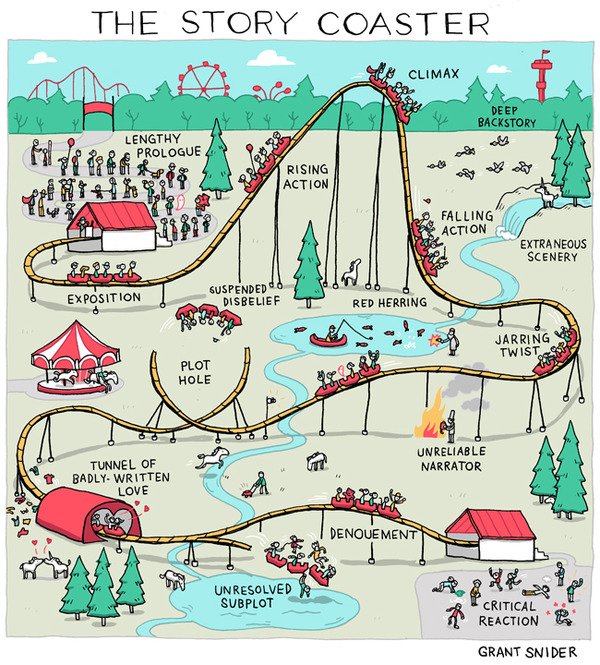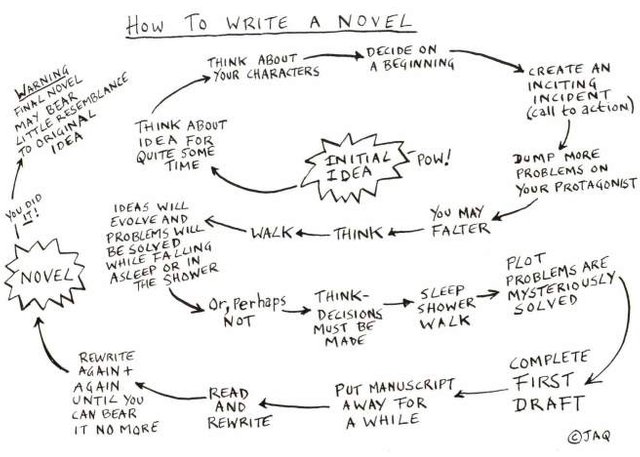Writing a Novel

So you have an idea for a great novel. You eagerly attack the keyboard, but a couple of chapters in you realise you have no idea how to turn this story idea into a novel? What you need is a step-by-step guide on how to write a novel. Above image by giphy.com
You have already take the most important steps to writing your novel:
- You had an idea and you started writing.
- You have recognised that a story does not make a novel.
- You have stopped to reassess what you are doing.
If there was a simple step-by-step guide, we would all be churning out novels, and they would all be the same.
Writing a novel is one of most complicated projects you will ever embark on. No one is born knowing how to write novels; the same as no one is born knowing how to read or write. These are skill we need to learn and develop.
Writing a novel is a learning process. You may be better at telling stories than some other people, or better at grammar, have a larger vocabulary, be better at editing, be willing to sit at a keyboard for extended periods etc, but it is unlikely you will be good at all the skills needed to write a novel at the start of the process, or even know what skills are needed.
Here are a few steps to get you on your way:
First you must understand the Plot:

Image: The story coaster by Grant Snider
At the very minimum you need a three line plot. This consists of
- A Premise – what is the story about.
- Complication(s) – (But) what difficulties do the characters have to overcome and how do they overcome these complications
- A Climax – How your characters over the complications and resolve the story.
Keep playing with your three line plot until you have something that grabs you or intrigues you, it’s not easy, but it pay dividends in the end: if the plot grabs you, it will grab your readers too.
Now think about the conflicts you have had in your life and use them as the basis for barriers that your protagonist has to overcome to get what they want. Obviously up-the-anti, and exaggerate the hell out of each situation, but basically that is how you develop the plot.
Next you need to understand your characters:
How your character(s) overcome the complications of the plot forms the main body of your story. Without complications, objections, and hurdles for your characters to overcome, your story will fall flat, because all stories are about how humans overcome conflict. Stories are so hard-wired into human nature, that even stories we think are about something else are ultimately about humans.
In fact, the more difficult you make it for your characters, the more their personalities will be exposed and the more interesting your story will become. Plotting is really all about storytelling and storytelling is all about conflict.
For instance: a Princess is born, grows up, meets the Prince of her dreams, gets married and lives happily ever after is not a very interesting story (unless you are three years old). A Princess grows up overcoming the eccentricities of her parents, meets the Prince of her dreams who turns out to be a monster, but the Princesses’ pure love helps the Princes overcome his Monstrous traits – Beauty and the Beast – is more interesting. Add that the two families are monstrous and compare that against the forbidden pure love of the prince and princess and you have Romeo and Juliet, turn pure love into obsession and you have Twilight. It’s all about what your characters have to overcome and how they go about it that makes your story interesting.
Character and conflict are at the heart of every good story. So here is what you do :
Dream up an interesting character:
Give them some interesting character flaws:
- Think of something they really, really want, then put it out of their reach.
- Dream up another character with opposite characteristics and have them really, really want the same thing.
- Now pit the two characters against each other, or they could be two aspects of the same character.
- Now you have a protagonist, an antagonist, a plot, and conflict – all the elements of a good novel.
Now you need to break the plot down into plot points:
Somehow you need to get you from the premise of your plot, through the complication, to the climax, so you will need a story arc.
At this point you may need to learn about story arcs: from a simple three act play (beginning,middle, end), through the classic eight point arc, to the sort of twenty-two point arc used in genre fiction.
Once you have settled on your story arc, you will need to come up with major scenes to populate your the arc. Remember, each scene also needs a simple story arc (I use a modified version of the classic story arc for my scenes).
Next you need some scene progression:
Now you need to tie all the scenes together and plan how you are going to get from one scene major scene to another. The key thing to remember is that every scene in a story arc, subplot, or character development, except the first, must be the direct consequence of what happened in another scene. Often this is the scene before it, but not always.
If you can’t work out a particular scene flow then work backwards. What has to happen in scene Y in order for scene Z to happen, what has to happen in scene X for scene Y to happen, what needs to happen in scene W… you get the idea.
Find out how you are doing:
Join a writing group, either physically or online, where members can read each other’s work and provide constructive feedback, this way you can all learn and grow together. You will soon discover what works and what doesn’t.
Publish your work in progress on somewhere like [Wattpad] (wattpad.com) and see what real readers think and how popular it is.
Keep tweaking, changing, and re-writing things until the story works. One of the things you will learn is that there is absolutely nothing that cannot be changed, scrapped, edited or re-written to make a novel work.
And finally:
There is a lot more to writing a novel than that (like editing—wow, a whole subject in itself), but I hope these steps will get you started on the journey so you can discover the other things for yourself as your novel and your skill develop.
I think this diagram I found on the internet sums up the novel writing process quite well:

Image by Jaq Hazell
The rest is down to hard work.
Good luck, and keep writing.
Nick
"love into obsession and you have Twilight." Why did you have to remind us of that horror?
Other than that really helpful stuff Nick, thanks for sharing.
Sorry, just trying to illustrate the point.
I loved the way you developed your article and I can see how it would help certain people. Most people need to organise - however, there are a few of us who cannot write if we have to organise.
I have not spent my life writing, only the last 18 years. However, much of it has been at the rate of 8 to 14 pages a day.
I did not have an idea for a novel. I had one very simple idea: A baby is born with the gift of empathy. She can feel everyone but she can also take what they feel, add what she wants and sent it back, for instance, softening their pain.
That is all I had for starting with. I have now written 13 books of between 1,200 to 2,000 pages each. At another site, for years, as I wrote and completed each book, I had about 740 readers downloading my books.
I never had compliments about my ideas; what I had was comments about my characters, some of them very touching.
Before, I tried to write poetry, but I was encouraged to study, send my poems to certain poetry mags and go to poetry coffee shops in London where you read out your poem and get criticised.
It killed my ability to write poetry (only one poem has survived out of hundreds over forty years) and I posted it here - at least I had one beautiful comment, so I'm not sorry.
Same with my love for sketching and painting. I was sent to art school and within less than a year I set everything on fire and never sketched or painted again.
As far as I am concerned, I do not write my story, my characters do. To make it clear that it is so, they write in a diary and my subconscious receives it and I write. Communication between conscious and subconscious is not that good, so they often get angry with me for messing up their lives.
I am making this long comment, because I want to tell your readers that you are correct and your advice is good for most people, but if they do not fit and need to do crazy - then they must go ahead and do it.
Good on you. I do know what it is like when the characters take over, but mostly I need to plan. Otherwise, the story just gets lost and I end up in a funk not knowing where it is going, and end up with my brain frozen. People who write by the seat of their pants are an alien species to me. I do not claim to be right; I only share what I know.
Pleased to make your acquaintance.
Nick
Thank you - and I loved being referred to as an alien species.
There is one advantage in writing my way. I am placed in the same situation as any other reader, I have no idea what is coming and so I too am reading a story. The minus side? It makes it very difficult to be objective and delete unnecessary paragraphs. Even if I've read what I've written ten times, I continue to find mistakes and not only superfluous sentences or paragraphs, but also (the only way I can think of putting it) split-hair parts that do not add to the story and only distract the reader for a moment. Luckily I have rid my stories of many of those.
Do you ever read the classics and wonder, that author who wrote two hundred years ago, when the techniques of writing were not as polished, what would he/she think of an article helping them to write more effectively? Could it be that they would recognise it as being something they have already taught themselves?
Not necessarily. I think the nature of story, the story arc, etc, is more than just cultural (there is no society in the world that does not have stories). I think story patterns express the nature of the human mind and how our brains are constructed/work.
Therefore, stories from the past are like evolution, the only ones we know about are the successful ones that chime with the human brain/mind. The rest have disappeared -
become extinct. I think 200 years ago, writing a successful novel was a lot more hit-and-miss than it is today.
Back then, they would have loved to have access to the wealth of story and writing information we possess.
I think the internet has made story more important to human society not less.
If the internet is being shaped by story, I wonder if the internet itself reflects the nature of the human mind/brain. Ooh, that's a deep question - I will have to consider a post on that one.
The Novel Writing Workshop: